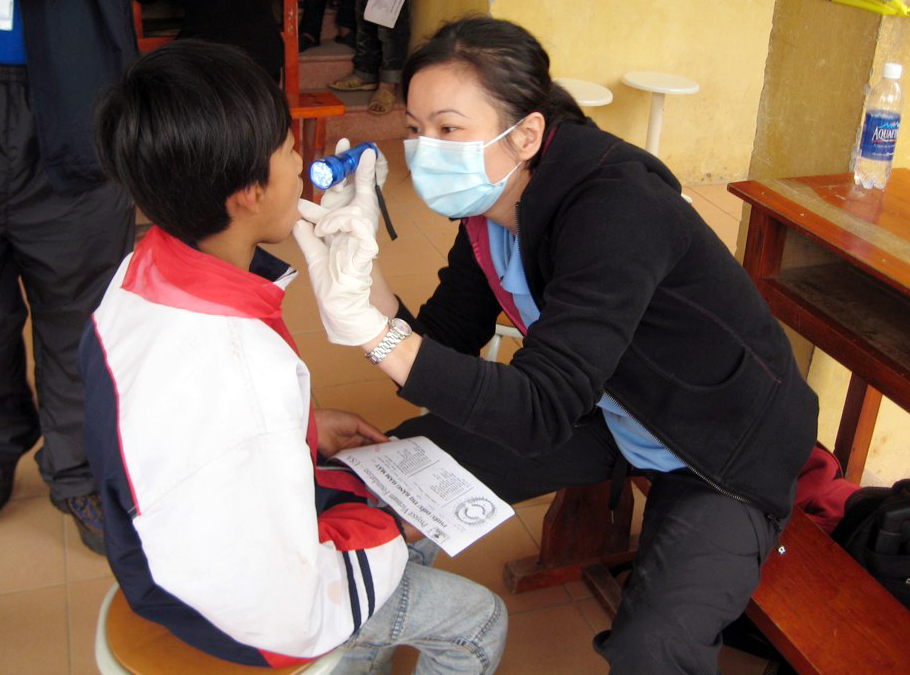Nonprofit organization Project Vietnam Foundation helps rural villages in Vietnam with improving medical training

Trang Ho examines the teeth of a child in Vietnam. Ho volunteered with the Project Vietnam Foundation to provide medical care to impoverished villages.
(Courtesy of Trang Ho)
By Sandy Bui
April 4, 2011 1:24 a.m.
In American medical schools, students are required to go to psychiatric hospitals and attain clinical hands-on training, regardless of the specialty they choose.
In stark contrast, medical students in Vietnam receive only two weeks of classroom training in psychiatry and neurology, said Dr. Jamie Feusner, an assistant professor of psychiatry at the UCLA Semel Institute.
Feusner traveled to Saigon in early March with the Project Vietnam Foundation to give three lectures to pediatricians who have minimal knowledge of how to recognize psychiatric problems in primary care settings.
Without the clinical experience in psychiatry, Vietnamese primary care doctors have been unable to address the psychological and psychiatric issues that arise in their patients, Feusner said.
Buddhist philosophy also pervades the culture, suggesting to civilians that one way of dealing with their problems is to try to move on and accept rather than change them.
Founded in 1996, Project Vietnam Foundation is a Southern California-based nonprofit organization that has brought to rural Vietnamese villages medical care and doctors of different specialties who impart medical training to the country’s doctors, according to the foundation’s website.
About 90 volunteers traveled with the group on their latest trip, said Feusner’s wife Trang Ho. This trip was the first that Feusner and Ho made with the foundation.
Ho volunteered with the primary care team that traveled to villages and distributed medications and gifts to patients. She was trained on-site to inspect children’s teeth and determined whether they needed fillings or teeth extractions, she said.
Because of the country’s restrictive policies with foreign nongovernmental organizations, patients could only go to the foundation’s clinics if they had received an invitation from the Vietnamese government, Ho said. The government recognizes the vulnerability of poor villagers and is cautious of possibly unwanted and revolutionary ideas, she added.
The government also prohibited Ho from going to the children’s hospital at which her husband lectured.
Since his trip, Feusner said he hopes to follow up with a clinical psychologist of pediatrics he met at a children’s hospital in Saigon. There is no psychiatrist in the hospital’s staff to supervise medical prescriptions or provide medical consultation, Feusner said.
Many Vietnamese doctors want to receive more training in psychiatric and psychological issues but face complex obstacles, such as having minimal training and no research mentors.
Limited data has been published on psychiatric problems and adolescent suicide in Vietnam, Feusner added.
Feusner wants to assist the Vietnamese doctor to organize and analyze her data so she can publish research in Vietnam.
For now, he hopes to find a child psychologist at UCLA who would be willing to supervise the doctor in cognitive-behavioral therapy. Once he receives permission within his department’s administration, he will set up continued monthly follow-ups with the Vietnamese doctor.
Imparting medical knowledge to these doctors is ineffective without the crucial continued follow-up and ongoing training, he said.
“There are so many things (to consider in clinical practice), and you could give a lecture and say this is the medication and dosage for these problems … but the reality is, the problems are very complex, and they evolve over time,” Feusner said.
The difficulties of continued consultation were echoed by Feusner’s sister-in-law Dr. Anh Nguyet Ho, an obstetrician/gynecologist and UCLA alumna who previously volunteered with the foundation and plans to return to Vietnam. Dr. Ho, who is also a board member of the foundation, continues to do email follow-ups with the doctors she met in Vietnam.
For the patients who go to the foundation’s village clinics, there are no follow-ups. If improvements are to be made, there need to be more groups on the ground to provide ongoing, free clinics for villagers, Trang Ho said.
“Maybe one day they will become wealthy enough to have that, but that’s going to be very a long ways off,” she said.


